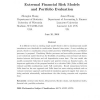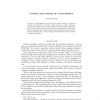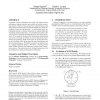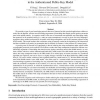DSS
2006
15 years 2 months ago
2006
This paper describes our experience aligning two simulation models of disease progression after biological attacks. The first model is the Incubation-Prodromal-Fulminant (IPF) mod...
CVIU
2006
15 years 2 months ago
2006
In this paper, we explore whether the Fresnel term can be used to improve the predictions of the Beckmann
106
click to vote
CSDA
2006
15 years 2 months ago
2006
Following the work of Hurvich, Shumway, and Tsai (1990), we propose an "improved" variant of the Akaike information criterion, AICi, for state-space model selection. The...
CSDA
2006
15 years 2 months ago
2006
It is difficult to find an existing single model which is able to simultaneously model exceedances over thresholds in multivariate financial time series. A new modeling approach, ...
104
click to vote
CORR
2006
Springer
15 years 2 months ago
2006
Springer
Many categories have been used to model concurrency. Using any of these, the challenge is to reduce a given model to a smaller representation which nevertheless preserves the relev...
105
click to vote
CORR
2006
Springer
15 years 2 months ago
2006
Springer
We consider the model of population protocols introduced by Angluin et al. [AAD+ 04], in which anonymous finite-state agents stably compute a predicate of the multiset of their in...
129
click to vote
CORR
2006
Springer
15 years 2 months ago
2006
Springer
In this paper we resolve an open problem regarding resettable zero knowledge in the bare public-key (BPK for short) model: Does there exist constant round resettable zero knowledg...
99
Voted
CORR
2006
Springer
15 years 2 months ago
2006
Springer
A plethora of aspect mechanisms exist today. All of these diverse mechanisms integrate concerns into artifacts that exhibit crosscutting structure. What we lack and need is a char...
113
Voted
CORR
2006
Springer
15 years 2 months ago
2006
Springer
We consider the problem of decision-making with side information and unbounded loss functions. Inspired by probably approximately correct learning model, we use a slightly differe...
123
Voted
CORR
2006
Springer
15 years 2 months ago
2006
Springer
We consider a type of zero-knowledge protocols that are of interest for their practical applications within networks like the Internet: efficient zero-knowledge arguments of knowl...





